What's New
Displaying results 1981 - 1990 of 4052
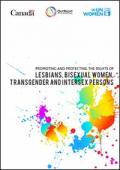
Resource | Publications,
States are obligated to exercise due diligence and take necessary measures to protect, prevent, investigate, punish and redress acts of violence, (direct and indirect) discrimination against all people, including on grounds of sexual orientation and gender identity (SOGI). Yet people who do not follow dominant sexual and gender norms regularly experience discrimination related to housing, social security, employment, and are at increased risk of violence and abuse.
This paper highlights the unique discriminations and exclusions lesbians, bisexual women, transgender and intersex persons (LBTI) face across the region as well as the challenging issue that gender and sexual diversity remains based on the proceedings of the 2016 regional consultation on promoting and protecting the rights of lesbians, bisexual women, transgender and intersex persons.
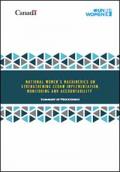
Resource | Publications,
This paper analyzes the monitoring and reporting on implementation of the Convention on Elimination of all form of Discrimination Against Women and the Beijing Platform for Action on National Women’s Machineries. National Women’s Machineries are key mechanisms for the advancement of women in South East Asia, established as the central policy coordinating unit ensuring that governments are accountable for the commitment made in the CEDAW and BPFA.
This paper endeavors to compile good practices, challenges and to strengthen the capacity of National Women’s Machineries for monitoring implementation of CEDAW and BPFA.
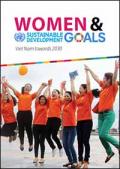
Resource | Publications,
The 17 Sustainable Development Goals (SDGs) were formally adopted by world leaders at the United Nations Summit for the post-2015 development agenda, held in New York from 25-27 September 2015.
"Transforming Our World: the 2030 Agenda for Sustainable Development" builds on the Millennium Declaration and Goals, a fifteen year journey that set out to reduce poverty, hunger, disease, gender inequality, and ensure access to water and sanitation by 2015. The Sustainable Development Goals are designed to tackle unfinished MDG business. They go further in tackling the root causes of poverty and inequality, ensuring development that works for all.
The 2030 agenda sets out 17 goals and 169 targets. In addition to Goal 5 to "Achieve gender equality and empower all women and girls", gender targets have been set for every goal, tackling the gender dimensions of poverty, hunger, health, education, water and sanitation, employment, safe cities and peace and security. This strong gender focus is a realization that achieving gender equality and empowering women and girls is key to achieving each and every one of the goals.

Resource | Publications,
Ensuring the health and well-being of the Rakyat is essential for the achievements of Vision 2020 in line with the National Missions Thrust in particular Thrust Four which is ‘To improve the standard and sustainability of quality of life’. With the commencement of the 10th Malaysia Plan in 2011, the Government of Malaysia plans to reform the healthcare delivery system with a focus on four key areas:
- Transforming delivery of the healthcare system;
- Increasing quality, capacity and coverage of the healthcare infrastructure;
- Shifting towards wellness and disease prevention, rather than treatment; and
- Increasing the quality of human resource for health.
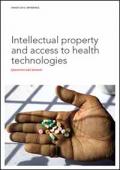
Resource | Tools,
This document provides a review of key issues related to intellectual property policies and their potential impact on access to HIV and other medicines. It is intended as an introduction to the issues for civil society engaged in the response to HIV and other health concerns.
By the end of 2015, almost 16 million people living with HIV were accessing antiretroviral therapy. The world would never have reached this historic achievement had it not been for the dramatic decline in the price of antiretroviral medicines over the past two decades—from just over US$ 10 000 per patient per year in the late 1990s to around US$ 100 per patient per year in many sub-Saharan countries in 2015. This drop in price was the result of sustained advocacy on the part of countries and communities affected by HIV to increase the availability of quality-assured generic antiretroviral medicines, in part by addressing intellectual property rights (IPR) issues.
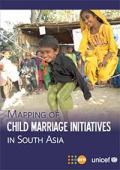
Resource | Publications,
This report lays out by country significant pieces of work that contribute to ending child marriage in eight countries of South Asia.
It starts with an overview of major regional initiatives, and then it covers government, UN and civil society/NGO initiatives by country. A final matrix identifies key strategies per initiative. A number of policies, key studies, and national plans are included as well for a better understanding of the legal foundation of child marriage and adolescent empowerment work.
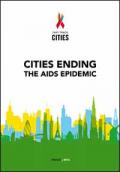
Resource | Publications,
Cities are at the forefront of global development: taking a leading role in national agendas and delivering on global targets. Urban strategies and actions are central to achieving the Sustainable Development Goals, including ending the AIDS epidemic by 2030. To achieve the end of AIDS, cities must meet the 90-90-90 target for HIV treatment by 2020 and reach ambitious milestones for preventing new HIV infections and eliminating stigma and discrimination.
This report testifies to the many actions and achievements of cities around the world in responding to the AIDS epidemic. By exploring and celebrating these efforts and outcomes, we can learn and inspire other pioneers to explore innovative, local solutions to ending their urban AIDS epidemics, especially in cities that are lagging behind.

Resource | Tools,
Positive Health, Dignity and Prevention for Women and their Babies: A treatment literacy guide for pregnant women and mothers living with HIV is intended for use by networks of women living with HIV, women’s groups, peer educators and others wishing to provide information and guidance to support women living with HIV through the decisions they will need to make before, during and after their pregnancy.
The facilitator’s manual and flipchart are intended to be used by leaders of support groups, peer educators or lay counsellors to facilitate small groups or community sessions with women living with HIV. Together, they provide accurate and comprehensive information to enable pregnant women and mothers living with HIV to know their rights and make informed decisions about their health, and the health of their baby.
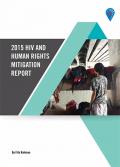
Resource | Publications,
The Malaysian AIDS Council (MAC) has compiled a total of 15 discriminatory cases that were reported by key populations affected by HIV and AIDS in 2015. These cases were reported to the MAC Policy Department who interacted with individuals directly to ensure accuracy of the accounts. Details were noted in a standardised form. Employment cases that occurred in the Federal Territory of Kuala Lumpur were mitigated together with the Department of Occupational Safety and Health of the Ministry of Human Resources. The Ministry of Health were informed of all cases of discrimination within their facilities. When transmitted between MAC and government agencies, names and identification details were blacked out, unless where the complainant had given consent to disclose. Actions toward mitigation of each case were taken within two weeks of receipt.
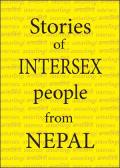
Resource | Publications,
This report was technically and editorally reviewed by Mx. Jensen Byrne. It is based upon personal stories submitted in writing by intersex persons themselves. during the 1st Intersex National Meeting in Nepal, held on the 8-9 February 2016 in Kathmandu. All contributors have given their express permission to be included in this collection and are aware that these stories are intended to be distributed widely and made freely available.





